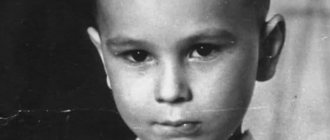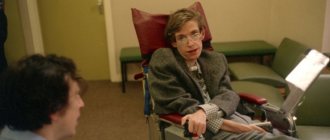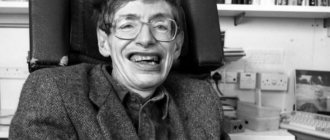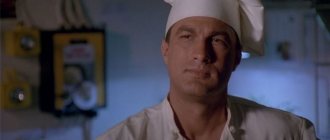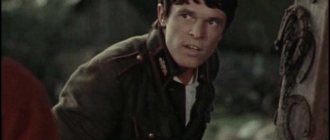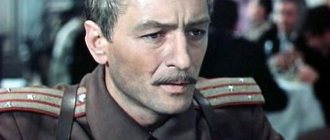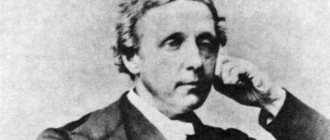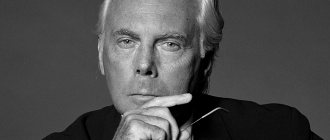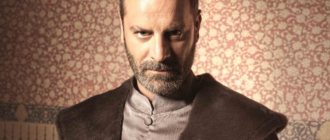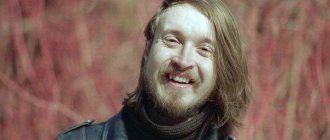Stephen Edwin King (born September 21, 1947, Portland, Maine, USA and present) is an American writer, author of novels that have sold more than 350 million copies.
During his creative life, King published over 250 works: 56 novels, 5 popular science books and about 200 short stories. More than a hundred films and television series have been made based on the writer’s works, and his name has become synonymous with the horror genre. Sales of his books reach record levels, novels become bestsellers and appear on “Must read” lists.
The remarkable thing about Stephen King's success story is that he was able to gain international popularity as a thoroughly American writer with little interest in the world outside his own country. How did a writer who grew up in a single-parent family and had problems with alcohol manage to become one of the most famous and best-selling authors of the 20th century? The biography of Stephen King will tell you about this.
Stephen King's Childhood and Family: The Man from Maine
Stephen King was born on September 21, 1947 in Scarborough, Maine, USA. Although the writer has Irish and Scottish roots, he now introduces himself to reporters as a “Man from Maine.”
The novelist's mother Nellie Ruth King, née Pillsbury (02/03/1913 - 12/18/1973) was the fourth of eight children. Mrs. King's family included simple rural farmers and builders. Ruth could not be called successful in her personal life; she was married twice and her marriage to Stephen King’s father also did not bring her female happiness.
The writer's father Donald King (05/11/1914-1980) was a merchant marine captain. His real surname was “Spansky”, but he replaced it with a euphonious one: “King” (English “king”, “ruler”) - it sounds proud.
The King's surname is often played up by journalists with the title "King of Horror", The King of Horror
Stephen's parents married on July 23, 1939 and moved to Chicago. After leaving the Navy, Donald King finds work as a traveling salesman, but selling vacuum cleaners does not bring good income. Family happiness was overshadowed by the absence of children; the doctor diagnosed Stephen’s mother with infertility. In 1945, the Kings adopted David Victor; the birth of their own baby in 1947 became a real surprise for the Kings. Stevie did not have time to remember his father; the former retired naval captain left the house in 1949 to buy cigarettes and did not return.
Stephen King doesn't remember his father because he disappeared when he was 2 years old.
When asked by newspapermen how this affected his future life, Stephen replies: “I don’t know, I haven’t reconsidered my life.” Stephen's mother told the children that their father was "kidnapped by the Martians." Most likely, she suspected what really happened to her husband. A story that could have become mystical ended up being banal. Employees of the CBS television and radio network figured it out when in the 90s. We were working on a story about Stephen King. The film crew contacted Donald King's social security number and found out that the writer's father was not abducted by aliens. He started another family in Pennsylvania, where he lived until his death in 1980 with another wife and four children. When asked whether Stephen King regrets not meeting his father, the writer is categorical: “No. “He not only left my mother and me alone, but also left a bunch of outstanding debts.”
Ruth King did not shy away from unskilled work: she worked as a laundress and a saleswoman. The family got by as best they could; relatives helped by sending the boys clothes. Ruth did not complain about life and did not give up, “but I was neither deaf nor blind,” the writer recalls. Steve calls his active and cheerful mother “simply a miracle.”
Ruth King raised Dave and Stephen alone
Stephen King spent his childhood on the move; his family moved not only from city to city, but also from state to state. Ruth and her sons visited one or the other of her sisters. Stevie managed to live in Chicago, Illinois, Fort Wayne, Indiana (his father's parents lived there), Malden, Massachusetts (with Aunt Molly), West De Pere, Wisconsin, Stratford, Connecticut ( at Aunt Lois's).
When Stephen turned 11, the family moved to Durham, Maine, a town with a population of 4 thousand people. Ruth King's elderly parents lived here and needed care. Ruth began to help her parents, and relatives provided her with a roof over her head and money for food. Stephen, his brother and mother moved into the house of his aunt Ethelin and her husband Oren. After the death of her father and mother, Ruth King remained in Durham, working as a housekeeper in a home for the mentally disabled in the town of New Gloucester. In 1973, at the age of 60, she died of cancer.
In the writer's works, Maine will become one of the favorite places where his intricate plots will unfold. The capital of King's Maine could be Castle Rock - King's fictional town, which is the main setting in "Necessary Things", "Sun Dog" and mentioned in "The Dead Zone", "Cujo", "It", etc. It is set in Derry (a fictional Maine town), which King described as the dark side of Bangor (a real town). The writer glorified the state of Maine, which in connection with him is referred to as the “Realm of the King of Horrors.”
A map of Maine, with real cities in green and King's fictional cities in blue.
Stephen grew up as a sickly child and wore glasses since childhood. Frequent moving did not improve health. He suffered a severe ear infection, a visit to the otolaryngologist and the piercing of the eardrum became the writer’s most vivid childhood memory: “My scream is still in my ears.” In addition to the unbearable pain, 5-year-old Steve remembered the doctor’s attitude, who lied that “it wouldn’t hurt.”
Stephen King as a child
Biography of Stephen King
Few admirers of the writer's talent know how interesting and instructive the biography of Stephen King is. It's time to learn more about the biography of the great King than you knew before.
On September 21, 1947, in the city of Portland, Maine, the future popular writer Stephen Edwin King was born into a simple American family. So the world gave us a wonderful and truly talented writer.
Is Stephen King cool?
Yes! It sucks!
His birth was unexpected because, according to doctors, his mother could not have children. This fact heated the atmosphere in the King family to the limit, and one day Stephen’s father left the house and did not return.
Nellie Ruth was left alone with two sons - her own Stevie and adopted David, but she did not give up and continued to provide for the family as best she could. In search of a better life, the Kings often moved from place to place. Because of this, Stephen King was sick a lot. Not knowing what to do in bed, the boy took a pen and paper and began to write.
The child’s desire to create stories arose at the age of seven. Then he discovered a box filled with science fiction and mysticism in his aunt’s attic.
Stephen made his first money by selling the newspaper Dave's Mustard Plaster, which he published with his brother. Already in 1963, King, together with school friend Chris Chesley, published his first collection of short stories. And he wrote his first story, “Invasion from the Stars,” which was “really published” in 1965.
After graduating from school, Stephen decides to volunteer for Vietnam, but his mother dissuades him from this rash act. So the aspiring writer entered the university in 1966, where he met his future wife Tabitha. In 1971, the couple got married, and a few years later they had children - son Joe and daughter Naomi.
Trying to support his young family, Stephen works in a laundry and then as an English teacher. This occupation does not bring in much income, so the King family is on the verge of poverty. Without abandoning his favorite pastime of writing stories, Stephen is eager to publish them, but publishing houses constantly reject his manuscripts, considering them of no interest to anyone.
Stephen King's popularity was brought to him by the novel "Carrie", which he first threw in the trash, but his wife, noticing this, forced her husband to finish writing the work. This book by King made him famous and gave him the opportunity to say goodbye to his teaching career. Stephen could now devote himself entirely to writing.
Since then, the author has received the title of Master of Horror, for his unique talent to create fascinating and scary texts that made every reader shake with fear. Stephen King has published a large number of books during his biography, which is still going well, many of which have become bestsellers. Based on the works, many films have been made that have taken their rightful place in world cinema.
3.2 / 5 ( 4 voices)
The beginning of a creative journey: a fee of 1 dollar
To get rid of boredom during his next illness, 6-year-old Stephen rewrites the text from the comic book bubbles and writes a sequel. Mom praised the little writer, but advised him to come up with something of his own. Stevie wrote 4 stories about a rabbit who helped children in trouble. His mother bought the stories, paying $0.25 each, so King earned his first buck as a writer.
It is noteworthy that, having become famous, Stephen will not neglect the 1-dollar fee. Since the late 70s, King began to practice the “dollar deal” - selling the rights to film adaptation of his story for $1. A prerequisite is the writer’s right not to release the film without his personal approval.
In 2020, film students from the Blaenau Gwent Film Academy (UK) purchased the right to film King’s story “Stationary Bicycle” for $1.
Little Stevie loved reading comics, especially about the “evil spirits” - the series “Tales from the Crypt”, “Tomb of Horrors”, “Madness”, etc. When asked by journalists what attracted him to the topic of the supernatural, King could answer that his mother was fond of magazine “Destiny” about paranormal phenomena, flying saucers, etc. and read these stories to my son. Or he could answer that somehow in the attic he discovered a repository of science fiction works, including books by Howard Lovecraft, and was fascinated by his work. And King could also tell that, in secret from his mother, he listened to the radio play “Mars Sky!” Ray Bradbury, and was fascinated by the feeling of loss of control over the senses that fear brought him. But a more correct answer would be the writer’s recognition that “this” lived in him from the beginning. He liked the feeling of fear. Even the scene of a forest fire from the cartoon “Bambi” was perceived by the boy with horror and inspiration. Later, when asked why King built his career on “horror stories,” he will answer: “What makes you think I had a choice?”
Stephen King developed a love for horror stories as a child.
Nightmares and pain
Stephen King developed his own special view of the world from early childhood. At the age of two, he was left without a father - he could not bear the hardships of family life, went out one evening for cigarettes and did not return. His mother explained to Stephen and his older brother that their father had been taken by the Martians. By the way, the surname “King” is not a pseudonym; his father’s name was Donald Edward King.
As a child, Stephen witnessed the death of his friend - he was hit by a freight train. King's family moved often because his mother took on any job. This did not add to the already weak boy’s health - he fell ill with measles, and after it acute pharyngitis, which developed into an ear infection. The doctor had to pierce Stephen's eardrum three times with a needle to clear the suppuration. The pain was hellish, but the boy was even more depressed by the fact that the doctor lied each of the three times - he said that it wouldn’t hurt, and at the same time he didn’t even remember the patient’s name. Due to long absences from school, Stephen had to study in the first grade for two years.
King read a lot, including comics, but not so much about superheroes, but about a variety of evil spirits. He studied the works of Edgar Allan Poe and Howard Lovecraft early on. At the same time, one of the main works that made a strong impression on Stephen as a child is invariably called the cartoon “Bambi”. He was touched not by the story of the fawn itself, but by the forest fire that caused panic and flight of animals. It was this fire, in which the frightened figures of animals rush about, that for a long time was the source of the boy’s nightmares.
Fear had long been the companion of the growing master of horror, and Stephen developed his own relationship with it. He said that he liked the feeling of fear, as well as the feeling it provoked of a complete loss of control over his own feelings.
School years
Due to constant illnesses, Stephen had to take the 1st class course a second time. He went to high school in Durham, completing 8th grade with good grades. The schoolboy liked to spend his free time at the Public Theater in Lewiston.
At that time, he had a feeling “as if his head was going to explode”: it contained so many ideas that required embodiment on paper. In 1959, 12-year-old Stephen and his 14-year-old brother David launched the local newspaper Dave's Mustard Plaster. The brothers divided the pages of the amateur press as follows: Dave was responsible for local news, Steve filled the pages with reviews of films and published stories that ended with the phrase “to be continued...”. “Mustard plaster…” costing 5 cents was distributed among relatives and neighbors.
In 1960, together with his best school friend Chris Chesley, 13-year-old Stephen published a couple of short stories in his homemade collection People, Places and Things. As far as Steve remembers, they only printed 10 copies.
The first truly published story appeared in 1965 in the pages of Comics Review magazine. The 6,000-word piece “I Was a Teenage Grave Robber” was inspired by Steve’s personal experience digging graves. As a fee, Steve was sent several author's copies of the publication.
Schoolboy Stephen King
In 1962, Stephen moved to Lisbon Falls High School and worked as a sports reporter for the local Weekly Enterprise newspaper. He was appointed editor of the school newspaper "Drum", but instead writes a collection of short stories, "Emetic", where he describes the fictional adventures of teachers with dark humor. The school authorities learned about the literary antics of a high school student. One of the teachers even demanded King’s expulsion, but he got by with an apology and additional classes.
In his senior year, the young man seriously thought about whether he would volunteer to go to Vietnam to collect material for a book. Ruth King was able to find a convincing argument for her son: “You can’t write anything to a dead person; with your eyesight, they’ll shoot you first.”
Having listened to the voice of reason, 19-year-old Stephen King enters the University of Maine.
Stephen King: first steps
The boy loved reading books and comics, watching horror movies on TV - he liked it when he was overcome by a feeling of fear. Therefore, with the approval of his mother, at the age of seven, he began to independently compose various stories. His first story was about a white rabbit and his three animal friends who save children from trouble. Mom praised his initiative and paid him twenty-five cents to continue the rabbit’s adventures.
In 1959, along with his older brother David, King began publishing his own city news and entertainment newspaper, called Dave's Paper, on an old mimeograph machine, which sold for five cents a copy. In 1960, he wrote a collection of short stories, People, Places and Things. At the age of fourteen, he created a story based on the film “The Well and the Pendulum” and published it for sale for a quarter to classmates in forty copies, for which he was expelled from school. So Durham High School opened its doors for him. He graduated with honors from the eighth grade there and transferred to Lisbon High in 1962.
Later, King began trying to get in touch with various magazines and publishing houses. And after a huge series of failures, in 1965 one publication finally responded: Comics Review published the story “I Was a Teenage Grave Robber,” renaming it “In the Twilight of Terror.”
University years
In 1966, Stephen became a freshman at the University of Maine in Orono, majoring in English literature. The $5 a week his mother sent him wasn't even enough to buy food, so Steve applied for a student loan and worked part-time at the Warambo spinning mill. The place of work amazes King with the number of rats living there. Later, in the story "Night Shift" (1970), he masterfully describes the attack of mutant rats.
King becomes involved in student life: he writes a popular column for The Maine campus newspaper, becomes a member of the student senate, and participates in an anti-war student demonstration.
Stephen King expressed his position on military actions in Vietnam, considering them unconstitutional
King receives his first royalties: in 1967, he sells a collection of short stories, “The Glass Floor,” to Startling Mystery Stories magazine. In 1968, King could already afford rent. He rents an apartment with classmate George MacLeod ($40 each) on North Main Street, Orono.
In 1970, King graduated from the University of Maine with a bachelor's degree and qualifications to teach high school English.
Since Stephen was a conscript of military age, after graduating from university he ends up on the medical board. King is declared unfit for military service due to his poor eyesight, broken eardrums, flat feet and high blood pressure. The founder of the news agency, Michael Bloomberg, was also “screened out” by the medical board due to a diagnosis of “flat feet.”
Stephen King: with a confident gait
In 1966, King graduated from high school and entered the University of Maine at Orono to major in English literature, graduating in 1970 with a bachelor's degree and being declared unfit for military service. Then he worked in a laundry and as an English teacher at a school in the city of Hampden, just to feed his family. And one day his wife, whom he met at university, found a draft of the novel Carrie in the trash and insisted that King finish it. And for good reason: in 1974, Doubleday published the novel, and Stephen received an advance of $2,500, and later, after selling the copyright to another publishing house NAL, another $200,000. So King gained fame and the opportunity to create in all his free time, without worrying about his financial condition. Then even more brilliant works began to pour out from his pen. For example, in 1974, after moving to Boulder, Colorado, King wrote the novel The Shining.
But suddenly the writer began to feel that his success was not deserved, that lately it was not his brilliant ideas and texts that were working for him, but his name. And then he secretly decided to start working under the pseudonym Richard Bachman in honor of his favorite musical group, Bachman-Turner Overdrive. And, of course, quite successfully. From this experiment emerge:
- "Rage";
- "Long Walk";
- "Men at work";
- "Running Man";
- “Losing weight”;
- "Regulators".
And then Richard Bachman “died of cancer,” and Stephen King, saying goodbye to him, in 1989 released the book “The Dark Half” about how the pseudonym took on flesh and took the place of the writer.
Another interesting fact is that since 1977, King has actively collaborated with young filmmakers who want to film his stories. Even then, King introduced a policy that he adheres to to this day. He is ready to give any student director the opportunity to film based on his short works after signing an agreement that the film will not be released widely without his approval. The issue price is one dollar. Stephen's accountant found him crazy every time he made a deal. And more than fifteen of these have already taken place.
Among King's subsequent brilliant works are:
- "The Gunslinger" (the first novel in the "Dark Tower" series);
- "Bag of Bones";
- "Green Mile".
- script for one of the episodes of the popular TV series of that time “The X-Files” called “Chinga”;
- "Blaze."
Family life
At the university, he met his future wife, Tabitha Jane Spruce, born in 1949. The girl also studied at the University of Maine and worked part-time in the student library Fogler Library. She wore black clothes and wrote prose and poetry. They began to live together, renting a cheap apartment along the Stillwater River in Orono. In 1969, Tabby became pregnant, but continued to attend classes, which earned her teachers reproachful glances. At the time of the birth of their daughter Naomi Rachel (Naomi Rachel) on June 1, 1970, Stephen had already graduated from the university, and Tabitha was a year away from receiving a diploma in history.
Despite the disapproval of the groom by the bride's parents, the young family planned the wedding. Stephen claims that he remembers well how he proposed to his future wife: “It was in 1971. She and I were lying in bed, I turned to her and said: “We have to get married,” to which she replied: “Let me think about it.” this after this night? In the morning Tabby gave a positive answer.
Stephen doesn't find a job in his field and gets a job at a gas station in Brewer, Maine. At gas stations, employees were fined if they forgot to thank a customer for filling up, and Steven had money deducted from his paycheck several times. As a result, he was fired “for lying”: having taken a day off under the pretext that “his wife’s relative died,” Stephen actually went to court. The case was heard about the theft of road fence cones, which King collected into his car while drunk. At the gas station they did not tolerate such a dubious type, but Tabitha, oddly enough, tolerated him. She also turned a blind eye to the fact that the groom showed up to the wedding ceremony drunk.
King's next job was a laundry, where he earned $1.60 an hour. The lovers planned their wedding day so that the laundry room would have a day off. The wedding took place on Saturday January 2, 1971 in Old Town, the bride's hometown.
Stephen King with Tabitha Spruce
Having received her education, Tabby also does not find work in her specialty and gets a job as a donut saleswoman at Dunkin' Donuts. The newlyweds live in a trailer on Route 2 in Hermon, Maine. The young parents used empty paper bags that Tabitha brought home from work as diapers.
In the fall of 1971, Stephen manages to find a job at Hampden Academy High School, but he gives a harsh verdict to teaching work: “working in a school is worse than working in a laundry.” King criticized the level of salaries (“school teachers lead a semi-scarce existence”) and the severity of the work (“it’s like they’ve connected a cable to your ears and are sucking all the juice out of you”).
At first, the writer really didn’t like the work in his specialty
On June 4, 1972, the Kings had a son, Joseph Hillstrom, and on February 21, 1977, a son, Owen Philip. It is noteworthy that the middle child, Joe Hill, was named after the composer Joe Hillstrom, who was executed in 1915 for murder (which he may not have committed). The writer’s sons followed in their father’s footsteps, both published a collection of short stories in 2005 (Owen “We’re All Together: Tales and Stories”, Joseph “Ghosts of the 20th Century”). Tabitha also became a writer and published 9 novels.
Stephen King has three children: a daughter and two sons
All this time, King finds time to write. Tabitha joked that King married her so he could have access to her Olivetti typewriter (King had an inferior model, the Underwood).
Even in difficult times, King did not give up writing, devoting 2 hours to it every day.
After college, he worked on the novel “Hit!”, which attracted the attention of Doubleday publishing house. But having corrected the manuscript 4 times at the editors’ request, Stephen never saw it published. The writer’s thorny path to recognition once again proves that celebrity success stories are never simple.
King sells stories to men's magazines Cavalier, Adam, Gentleman, Bust, and Chic. When Stephen's mother expressed a desire to read his works, the writer sent her copies of magazines with “advertising for adults” covered in them. King was offered to write more explicit stories (spiciness was paid higher), but King was unable to write explicit porn.
Stephen King - biography
Stephen Edward King is a popular American writer who works in the genres of horror, thriller, detective, fantasy, mysticism, gothic, and science fiction. He is also a director, journalist, producer and even an actor. For his large number of amazing works in the horror genre, Stephen is called the king of horror.
The future writer was born on September 21, 1947 in Portland, Maine, in the family of a captain and a pianist. The birth of a boy came as a surprise to his family - doctors diagnosed Steve’s mother with infertility, and the couple adopted newborn David two years ago. Stephen's father abandoned the family when the boy was two years old - he could not stand the tense situation and lack of money. Having left one day for cigarettes, he did not return home. Subsequently, his ex-wife learned that he had a new family and four children. Stephen learned of his father's fate only in 1990, when he was no longer alive.
Stephen and David's mother Ruth had to raise and provide for the children on her own. She worked hard at low-paying jobs to feed her sons, but she persevered and did not complain about life. Fortunately, their family had help from numerous relatives on Ruth's and her ex-husband's side. Stephen King, his mother and brother were constantly on the move - they temporarily lived in the states of Connecticut, Indiana, Massachusetts along with their grandparents and other relatives.
When King turned eleven, his family returned to Maine. Ruth had to look after her parents. After their death, she remained there to live, working part-time in a home for people with mental disabilities. King repeatedly depicted the history of his family and his childhood in his works. One of the most horrific memories of his childhood was the death of his friend, who was hit by a freight train in front of the boy's eyes.
Stephen was a very sick child. Due to constant moving, his health weakened even more. Due to constant illness and falling behind in school, Stephen remained in first grade again.
Steve developed a passion for reading and creativity quite early. At the age of seven, he discovered a huge number of comics and books in the genre of science fiction and horror in his aunt's house. Having swallowed them in one gulp, the boy decided to create his own works. He wrote several works in a fairy-tale setting and received his mother’s approval. His series about a little rabbit driving around the city and helping those in trouble was especially successful. Then the boy received his first fee - twenty-five cents for each work.
In early 1959, Stephen and his brother became the authors and publishers of the newspaper “Dave's Mustard Plaster,” which displayed major local news and included a story with Steve's continuation. The publication was printed on an old typewriter and distributed among friends and relatives for a purely symbolic fee - five cents.
The young writer's next literary work was a collection of stories, People, Places and Creatures, co-written with friend Chris Chelsea in 1963. Then the work “Invasion from the Stars” was published, again published on rotaprint. Stephen's first book, published in print in 1965, was the short story I Was a Teenage Grave Robber.
During his school years, King not only was engaged in writing, but also worked in the field of journalism, publishing the school newspaper “Drum” and creating sports reports for the Weekly Enterprise. Having received secondary education, the graduate decides to enter the University of Maine, located in Orono. To earn money for education, a young man works part-time in a weaving industry during preparatory courses. The writer's most vivid memory of this work was the huge number of rats living in the building (he used this fact in one of his works).
In 1970, Stephen graduated from his Alma Mater as a certified specialist in English literature. He was declared unfit for military service due to poor health. A year later, he starts a family with Tabitha Pruss, whom he met while studying at the university. The young family lived quite modestly, constantly experiencing financial difficulties. King got a job as a school English teacher, Tabitha worked part-time as a waitress. A particularly big blow to the family budget was the appearance of two children in the family in the first three years. In parallel with his work, Stephen continued to engage in creative work, but without much enthusiasm (the novel “The Long Walk,” sent to the publishing house during his student years, was rejected, which undermined Stephen’s faith in himself). He creates another work, “Kerry,” but throws it away without finishing it. His wife, having found a draft of a novel in the trash, insisted that Stephen finish it. What a surprise the writer was when this book was allowed to go into print, and King received an advance of two and a half thousand dollars. This work was then resold to another publishing house, and King received his first large fee - two hundred thousand dollars. This money was enough to leave my teaching job and seriously engage in creativity.
In the early seventies, Stephen King created one of his most popular novels, “The Shining.” Then followed no less striking works, included in the list of his best books: “The Fate of Salem”, “The Dead Zone”, “Igniting with a Glance”, “Cujo”, “Christine”, “Thinner”, “It” and many others. As a literary experiment, the famous author publishes some of his work under the pseudonym Richard Bachman to see if he can succeed with his new creative name. However, he was quickly exposed - the similarity between King's and Bachman's books was too obvious.
Since 1974, the writer began to abuse alcohol; Drugs soon joined this hobby. Surprisingly, King created real masterpieces while under the influence of alcohol and drugs. His wife put an end to these addictions in 1987 with an ultimatum. Stephen gathered his will into a fist and since then has not touched alcohol and, especially, drugs.
On June 19, 1999, King falls under the wheels of a minibus, as a result of which he is seriously injured and undergoes numerous operations. This event was reflected in his books, and the numbers 19 and 99 became special in the Dark Tower series. In 2002, the writer announced the end of his creative activity due to health reasons, but did not keep his word - his works are still published to this day.
By 2020, the author’s writing collection included about sixty novels and more than two hundred novels and short stories. The total number of King books sold is about 350 million. More than thirty of his works have been filmed (the most popular adaptations are “The Lot” (“Salem’s Lot”), “The Shining”, “The Dead Zone”, “It”, “The Green Mile”, “Dreamcatcher”, “The Shawshank Redemption”) . All of Stephen King's books, as well as the films based on his works, impress with their atmosphere and deep psychologism. Each new work of the prose writer immediately hits the top lines of reader ratings.
The American writer has more than seventy literary awards to his name. In 2003, the iconic author received a medal for contributions to American literature from the National Book Foundation, and in 2014, the US National Medal of the Arts.
Our site provides the opportunity to read Stephen King’s books online for free in Russian, as well as download the author’s e-books in fb2 (fb2), txt (txt), epub, rtf formats. The sequence of books in the writer's bibliography is on the website in chronological order.
Novel "Carrie": Success at the bottom of the trash can
One day while cleaning, Tabitha pulled the drafts of the novel Carrie out of the trash can. Mrs. King insisted that her husband finish the work and send it to the publisher. While drafting a story about a downtrodden girl with mystical powers, Tabitha was able to consider a future bestseller. Her foresight brought Steve success: Doubleday published Carrie in 1974. The novel became a kind of “apology” for King - as a schoolboy, he also offended (like everyone else in the class) a couple of students, one “too poor”, and one “from a religious family.” A little later, the rights to the book were bought by the New American Library, King's fee was $200 thousand.
In the autobiographical book “How to Write: Memoirs of a Craft” (2002), the writer notes the significant role of his wife in writing a number of his novels. Carrie is listed as a Book of the Century by the New York Public Library.
The rights to the film adaptation of “Carrie” were bought by the film company United Artists Entertainment, and the film appeared on screens in 1976. The audience liked the horror film and brought King well-deserved success.
Now Stephen could forget about the trailer, as well as about teaching at school. He could devote as much time to writing as he wanted. But did this benefit him?
Problems with alcohol
Stephen King's problems with alcohol and drugs are not a secret to the general public. Now the writer speaks about his problems with remarkable self-irony. Stephen began drinking at the age of 18 and marriage did not stop King's addiction. In 78-79, King could drink a whole case of beer in a day. When Maine mandated bottle recycling, King began stockpiling empty cans to send to a recycling center. The amount of cans in the garage trash bin that had accumulated over the course of a week led him to believe he had become an alcoholic.
Biography of Steven Spielberg - the highest-grossing film director in the history of cinema
In 1977, the novel “The Shining” was published, in which Stephen King based the alcoholic father of the main character on himself. The writer claims that he was not a public “drunk” and did not harm anyone: “he did not break chandeliers and did not throw people out of windows.” The children took his drunkenness for granted, because they did not see anything else. When asked by a journalist how he managed to lead such a lifestyle for 8 years while remaining the head of the family, King replies: “I was able to cook breakfast and give it to the children at school.” Following beer in 1978 came hard drugs, cocaine, to which he was addicted until 1986. The writer asks not to ask how he managed to hide his drug use and alcohol, because he simply does not remember: “that time is all a fog for me.” His wife admitted that at that time, out of 24 hours in a day, there were only 2-3 hours when Stephen “was not a vegetable.”
In his novel Misery (1987), King metaphorically embodied the alcohol and drugs that held him captive as the crazed nurse who held the famous writer captive. Not all horrors depicted by the author on paper should be taken literally, and “Misery” is proof of this. The main character of the novel, Annie Wilkes, is a cocaine addict and the number one Stephen King fan at that difficult time.
"Sex, drugs and rock and roll" in King's interpretation sounded like "Books, drugs, alcohol"
Meanwhile, King’s career was going uphill, and money appeared in the family, which at first Mrs. King tried on with her husband’s addictions. However, when King began to appear in public “tipsy” and once rudely pushed his wife away, Tabitha decided to deliver an ultimatum: “Either family, or alcohol and drugs.”
All this time, Stephen King convinced himself that he simply could not write without drinking and other stimulation. After all, he is a creative person! Hemingway drank too! But the realization that he could lose his children and wife, as well as the remnants of common sense, helped him understand that a drinking writer is no different from a drinking janitor. He decided that he would sacrifice writing in order to watch his children grow up.
During his first year of sobriety, the writer did not get out of depression and attended Alcoholics Anonymous groups. From morning to evening I sat at the typewriter, waiting for inspiration that never came. But gradually King returned to work, to his family, to himself. King hasn't drank a drop of alcohol since the late 1980s, and the first novel he wrote after quitting drugs and alcohol was Needful Things (1991).
King's books
Stephen King did not find himself hostage to one novel; after “Carrie,” he churned out bestsellers one after another. Literary portals have still not come to a consensus on which works of the writer are the best. The ratings, which take into account the assessments of readers and critics, mainly indicate the following works by King:
The list of “BBC's 200 Best Books,” compiled in 2003 based on a survey of 750 thousand UK residents, included 3 of his works: “The Stand” (54th place), “It” (144), “The Green Mile” (146 ).
The author himself calls “The Story of Lisa” (2006) his best book, which is significant for him because it reveals the important topic of marriage. King's wife not only brought her husband success as a writer, but also became his salvation from alcohol and drug captivity.
It would be unfair and one-sided to consider King a “horror writer.” Stephen breaks the stereotypes of his own image, convincingly embodying dramatic works, historical fiction, science fiction, and fantasy on paper. However, King does not hide the fact that he is most drawn to the horror genre. His writing style is distinguished by sharpness, attention to dialogue, and the discovery of human vices. King is a brilliant storyteller who has the power to create entire worlds built on the confrontation between truth and untruth, good and evil.
The writer also opposes the division of a number of areas of fiction into “genres,” which the literary establishment calls “tabloid.” King is convinced that people who create something incredible erase the boundaries of what is permissible.
Biography of Paulo Coelho - success story, quotes, sayings
The writer published 7 novels under the name Richard Bachman, until his alter was discovered by literary agent Steve Brown. Therefore, in 1985, Bachman died of “pseudonym cancer,” and King ceased publishing under that name.
Awards and criticism
Stephen King Awards
Among the most significant awards and titles of Stephen King, we note the following:
- medal of the US National Book Award “For outstanding contribution to American literature”, which actually means the status of “a living classic of American literature” (2003);
- multiple winner of the Bram Stoker Award from the Horror Novel Writers Association;
- laureate of the O. Henry Prize (1995);
- title of "Grand Master" from the American Mystic Writers (2007).
In 2020, Barack Obama awarded Stephen King the US National Medal of the Arts “For books that have moved people for decades.”
According to King's literary agent Chuck Verrill, Stephen does not have sky-high ambitions: “He doesn't necessarily want to be in first place. The only one he was worried about was Tom Clancy (American author of techno-thriller novels). Both were published in Penguin at one time, and it was explained to Stephen that he was considered second fiddle.” For now, King is “very happy with the way things are today.”
Criticism of the writer
The writer often does not find the approval of his colleagues in the writing workshop. Some of his fellow writers disparagingly call his works “pop for the masses.” Yale University professor and literary critic Harold Bloom called King's 2003 National Book Award "a step toward decline in the process of reducing cultural life to the level of consumer goods." The culturologist recognized the writer himself as “unworthy of the attention of a serious reader.” The secret of Stephen King's success is that he breaks the mold, as if a popular writer has no right to be taken seriously.
It’s high time for the literary “elite” to come to terms with the idea that Stephen King no longer needs their approval and recognition. Those who contrast commercial success with the artistic value of works are simply expressing their own snobbery.
Stephen King and JK Rowling, whose literary talent was also questioned by critics
At one time, Charles Dickens was also criticized: “Isn’t it stupid to evaluate his melodramatic and sentimental tricks on their merits?” Dickens has stood the test of time, whether King will stand the test of time, “we’ll have to wait and see.”
Stephen King short biography
The recognized king of horror, American writer Stephen Edwin King was born on September 27, 1947 in Portland, Maine. His birth was a pleasant surprise for the King family: Stephen's mother Nellie Ruth King was convinced by doctors of her infertility and even two years before the birth of the future writer, she adopted a newborn boy, David Victor. However, the appearance of the baby could not save the shaky relationships in the family. Donald Edward King, Stephen's father, was known as a ladies' man and rake. When his son was two years old, he went to buy cigarettes... to a new family. For a long time there was no contact with him, but as it turned out later, he lived very close to him with his new wife and four children from his new marriage. It was very difficult for Nellie Ruth alone, with two children in her arms. She always turned to her sisters and parents for help, but did not lose heart and did not give up. As a child, the future writer was very sickly. The measles infection did not cause complications in the ears and throat. His eardrum was pierced three times to drain fluid. The operation was very painful, and the doctor, who constantly lied that it wouldn’t hurt, was terrifying. Due to illness, Stephen stayed for a second year in first grade. Sitting at home and experiencing constant pain, he began to write short stories. This activity was approved and fully supported by the mother. At the same time, he became interested in reading, as well as comic books and films in the horror genre. The scene showing a forest fire in the animated film about Bambi left a huge mark on him; for several weeks after watching it, Stephen had nightmares. IN 1959
In the year, together with his brother, Stephen began publishing the newspaper "Dave's Mustard Plaster", in which he wrote reviews of TV shows and films, and wrote short stories.
The brothers distributed the newspaper among friends and relatives for five cents. Stephen wrote reviews of films and television shows, as well as short stories. In 1960
, together with Chris, Chelsea King published a homemade collection of short stories, People, Places and Things, and a year later the book The Star Invaders.
King met his future wife Tabitha Spruce, with whom he is still happy, at the University of Maine, where the author studied since 1966
.
In 1971, after marrying Tabitha, King began working as an English teacher at a school in Hampden, Maine. He continues to write, but without success, until Tabitha pulls out the unfinished novel Carrie from the trash can. She found him very interesting, and she persuaded Stevin to finish the book. In 1974
, the novel was published by Double Day, and King received an advance of $2,500 for publication.
In 1974
, the publishing house NAL bought the right to publish Carrie for
400,000
.
King receives half the amount and leaves the school. In the fall of 1974,
in the city of Boulder, Colorado, “The Shining” was published from the writer’s pen.
For some time, King wrote novels under the pseudonym Richard Bachman (“Rage”, “The Long Walk”, “Road Work”, “The Running Man”, “Thinner”). The revelation came courtesy of bookstore salesman Steve Brown, who compared King's early works to Bachman's novels. Since the late 70s
, King has received proposals for film adaptations of his novels.
He introduces for himself such a concept as a “dollar deal” - that is, any student director can film a short story by Stephen King for 1
, but King must fully approve the finished version of the film.
With the coming fame, the writer was overtaken by problems, alcohol and drugs. King doesn’t even remember how he wrote many of his masterpieces, such as “Cujo”, “Tommyknockers”, “Christina”. His wife was by his side all the time and helped him get rid of drug addiction. The writer described his condition during the period of illness quite accurately and in detail in the novel “Misery,” which was later awarded the Bram Stoker Prize. In the summer of 1999,
while jogging, the writer was hit by a van.
The injuries were very serious. His right leg was almost amputated. This tragedy was reflected in the seventh part of King’s cult work “The Dark Tower” and in one of the episodes of the novel “Royal Hospital”. In 2002
, King announced that he was retiring from writing.
But already in 2004
, the eighth part of “The Dark Tower” was released, and in
2006
, “Lisey’s Story”; also, a series of works by the author continues to delight fans from
2008
to
2016
.
To date, Stephen King is the author of 55
novels,
5
popular science books, and many short stories, which have been based on about
100
films and TV series.
In many films based on his works, King appeared in episodic roles. The writer has many literary awards, and in 2014
he was even awarded the US National Medal of Arts “for combining compelling stories with analysis of human nature.” In his marriage to Tabitha King, two sons and a daughter were born, and now there are already four grandchildren. At the same time, the writer’s wife and sons also devoted themselves to literature.
Film adaptations of works
The best film adaptations according to King
King's diverse work served as the basis for more than a hundred films and television shows. Some of the writer’s works were even staged on the theatrical stage (“Fury”, “Fog”, “Misery”, etc.). Perhaps, his stories lend themselves best to film adaptation, because short stories do not stretch well into the full-length film format, and novels are difficult to “squeeze” into film scripts. The following is a list of the “Best Stephen King adaptations” according to the author himself.
In 2020, director Andres Muschietti's It became the world's highest-grossing horror film of all time. The writer calls “Apt Student” simply an amazing film, and calls “Stand by Me” his favorite film adaptation.
Worst film adaptation according to the author
King's film adaptation of the novel The Shining, which tells the story of a hotel filled with otherworldly creatures, received less favorable reviews. Stephen King dislikes Stanley Kubrick's 1980 film of the same name, claiming that "the book just glows compared to the cold film." This rejection of Kubrick's directorial vision led to the fact that in 1997 Stephen King, together with director Mick Garris, began working on his own film adaptation of the book.
But critics and viewers favor Kubrick’s film adaptation of The Shining, calling completely different films the worst incarnations on the screen: Maximum Overdrive (1986), where King acted as director and screenwriter, Cell Phone (2016), which made it to the TOP worst pictures of 2020" and the series "Under the Dome" (2013-2015), in which only names remained of the book's characters.
Stephen King's Greatest Fear
On June 19, 1999, at 4:30 p.m., Stephen King, while walking along the side of the highway, had an accident when he was run over by a blue van, the driver of which was distracted by his Rottweiler. The writer was only partly to blame for the accident; he was inattentive, because he was reading (“Home” by Bentley Little) and did not look around. King will buy the car that hit him for $1.5 thousand and send it to a landfill.
The writer’s rehabilitation took a long time. After the accident, King took large amounts of painkillers, was unable to work on a computer, and wrote by hand.
After the incident, Stephen makes a statement that he will stop writing as soon as he completes The Dark Tower. Since then he has published 15 more novels. People react differently when death approaches. For example, Jeff Bezos, after a helicopter accident in 2003, just decided to “avoid helicopters.”
But the writer’s fear of death is not the strongest. Despite his skill, which no longer needs proof, King worries every time whether he can write another novel and whether readers will like it. This fear always sits inside him.
Stephen King: biography of the writer
Stephen King, whose biography is very interesting, was born on September 21, 1947 in Portland (Maine, USA). He began writing at the age of seven, after finding a drawer full of horror and fantasy novels at home. Later, King and his brother begin to create their own newspaper. Thus, before even finishing school, the future writer gains experience as a journalist by writing articles for the school newspaper. Then he decides to become a writer. To go to university and earn money for education, Stephen King works at a weaving factory. In 1966 he entered the University of Maine.
Stephen King's main passion and legacy are books; you can see the list of the best books in this section. The writer focuses on his home state of Maine. A distinctive feature of his work is his description of the life of small American towns, where everyone knows each other. King reveals family secrets, looks into the most hidden corners of human consciousness, which attracts most readers.
Meanwhile, its popularity is truly enormous. Over the course of his life, the author managed to sell more than 350 million copies. In addition, King is considered one of the most “prolific” writers of our time: he managed to publish fifty novels and does not stop there. Many films have been made based on his novels, and comic books have also been created based on his stories. His work also includes non-fiction novels, which he wrote under the pseudonym Richard Bachman. For his work, King received the Bram Stoker Award and a number of other prestigious awards.
If you are interested in Stephen King, you can find the books, the list of which is quite extensive, just below.
Charity
After the 1999 accident, King began to think about financial support for those people who, unlike him, could not afford to pay for the therapy required after an accident. The writer created a charitable organization that would sponsor the treatment and rehabilitation of such patients.
Stephen is also a full-time donor to the American Cancer Society. In 1986, together with his wife, King founded a foundation that supports initiatives of citizens of Maine.
The Stephen and Tabitha King Foundation has been providing assistance since 1986
In 2014, Stephen King took part in the Ice Bucket Challenge, which consists of pouring ice water on camera and raising funds for motor neurone disease patients.
Biography of Stephen King in English
Home>Biographies in English>Biography of Stephen KingHere you can read Stephen King's biography in English.
Stephen Edwin King (born 09/21/1947) - American author.
Stephen Edwin King is an American author best known for his bestselling horror novels. King was the 2003 recipient of The National Book Foundation's Medal for Distinguished Contribution to American Letters. In many ways Stephen has changed the movie and book industry forever. he has influenced many currently famous writers.
King evinces a thorough knowledge of the horror genre, as shown in his nonfiction book Danse Macabre, which chronicles several decades of notable works in both literature and cinema. He has also written stories outside the horror genre, including the novella collection Different Seasons, The Green Mile, The Eyes of the Dragon, The Stand, Hearts in Atlantis and his magnum opus The Dark Tower series. In the past, Stephen King has written under the pen names Richard Bachman and (once) John Swithen.
When King was three years old, his father, Donald Edwin King, deserted his family. His mother, Nellie Ruth Pillsbury, raised King and his adopted older brother David by herself, sometimes under great financial strain. The family moved to Ruth's home town of Durham, Maine but also spent brief periods in Fort Wayne, Indiana and Stratford, Connecticut.
As a child, King witnessed a gruesome accident - one of his friends was caught on a railway track and struck by a train. It has been suggested that this could have been the inspiration for King's dark, disturbing creations, though King himself dismisses the idea.
King attended Durham Elementary School and Lisbon Falls High School.
King has been writing from a young age. When in school, he wrote stories based on movies he had seen recently and sold them to his friends. This was not popular among his teachers, and he was forced to return his profits when this was discovered. The stories were copied using a mimeo machine that his brother David used to copy a newspaper, Dave's Rag, which he self-published. Dave's Rag was about local events, and King would often contribute. As a young boy, King was an avid reader of EC's horror comics, which provided the genesis for his love of horror. He loved reading Tales from the Crypt.
His first published story was “In a Half-World of Terror” (retitled from “I Was a Teen-Age Grave-robber”), published in a horror fanzine issued by Mike Garrett of Birmingham, Alabama.
From 1966 to 1971, King studied English at the University of Maine at Orono. At the university, he wrote a column titled “King's Garbage Truck” in the student newspaper, the Maine Campus. He also met Tabitha Spruce; they married in 1971. King took on odd jobs to pay for his studies, including one at an industrial laundry. He used the experience to write the short story “The Mangler” and the novelette “Roadwork” (as Richard Bachman). The campus period in his life is readily evident in the second part of Hearts in Atlantis.
After finishing his university studies with a Bachelor of Arts in English and obtaining a certificate to teach high school, King taught English at Hampden Academy in Hampden, Maine. During this time, he and his family lived in a trailer. He wrote short stories (most were published in men's magazines) to help make ends meet. As told in the introduction in Carrie, if one of his kids got a cold, Tabitha would joke, “Come on, Steve, think of a monster.” King also developed a drinking problem which remained with him for over a decade.
During this period, King began a number of novels. One of his first ideas was of a young girl with psychic powers. However, he grew discouraged, and threw it into the trash. Tabitha later rescued it and encouraged him to finish it. After completing the novel, he titled it Carrie, sent it to Doubleday, and more or less forgot about it. Later, he received an offer to buy it with a $2,500 advance (not a large advance for a novel, even at that time). Shortly after, the value of Carrie was realized with the paperback rights being sold for $400,000 (with $200,000 of it going to the publisher). Soon following its release, his mother died of uterine cancer. His Aunt Emrine read the novel to her before she died.
In On Writing, King admits that at this time he was consistently drunk and that he was an alcoholic for well over a decade. He even admits that he was intoxicated while delivering the eulogy at his mother's funeral. "I think I did a pretty good job, considering how drunk I was at the time." (On Writing: A Memoir of the Craft) He states that he had based the alcoholic father in The Shining on himself, though he did not admit it (even to himself) for several years.
Shortly after the publication of The Tommyknockers, King's family and friends finally intervened, dumping his trash on the rug in front of him to show him the evidence of his own addictions. As King related in his memoir, he sought help and quit all forms of drugs and alcohol in the late 1980s, and has remained sober since.
King spends winter seasons in an oceanfront mansion located off the Gulf of Mexico in Sarasota, Florida. Their three children, Naomi Rachel, Joseph Hillstrom King (who appeared in the film Creepshow), and Owen Phillip, are grown and living on their own.
Both Owen and Joseph are writers; Owen's first collection of stories, We're All in This Together: A Novella and Stories was published in 2005. The first collection of stories by Joe Hill (Joseph's pen name), 20th Century Ghosts, was published in 2005 by PS Publishing in a very limited edition, winning the Crawford Award for best new fantasy writer, together with the Bram Stoker Award and the British Fantasy Award for Best Fiction Collection. Tom Pabst has been hired to adapt Hill's upcoming novel, Heart-Shaped Box, for a 2007 Warner Bros release.
King's daughter Naomi is a Reverend in the Unitarian Universalist Church in Utica, New York, where she lives with her partner.
In 2002, King announced he would stop writing, apparently motivated in part by frustration with his injuries, which had made sitting uncomfortable, and reduced his stamina.
“I'm writing but I'm writing at a much slower pace than previously and I think that if I come up with something really, really good, I would be perfectly willing to publish it because that still feels like the final act of the creative process, publishing it so people can read it and you can get feedback and people can talk about it with each other and with you, the writer, but the force of my invention has slowed down a lot over the years and that's as it should be. I'm not a kid of 25 anymore and I'm not a young middle-aged man of 35 anymore — I'm 55 years old and I have grandchildren, two new puppies to house-train and I have a lot of things to do besides writing and that in and of itself is a wonderful thing but writing is still a big, important part of my life and of everyday.”
Since 2003, King has provided his take on pop culture in a column appearing on the back page of Entertainment Weekly, usually every third week. The column is called “The Pop Of King”, a reference to “The King of Pop”, Michael Jackson.
In October 2005, King signed a deal with Marvel Comics, to publish a seven-issue, miniseries spinoff of The Dark Tower series called The Gunslinger Born. The series, which focuses on a young Roland Deschain, is plotted by Robin Furth, dialogued by Peter David, and illustrated by Eisner Award-winning artist Jae Lee. The first issue was published on February 7, 2007, and because of its connection with King, David, Lee, and Marvel Editor-in-Chief Joe Quesada appeared at a midnight signing at a Times Square, New York comic book store to promote it . The work had sold over 200,000 copies by March 2007.
In June 2006, King appeared on the first installation of Amazon Fishbowl, a live web-program hosted by Bill Maher.
King, a long time supporter of small publishing, has recently allowed the publication of two past novels in limited edition form. The Green Mile and Colorado Kid will receive special treatment from two small publishing houses. Both books will be produced and be signed by both King and the artist contributing work to the book. Half of King's published work has been re-published in limited (signed) edition format.
On February 14, 2007, Joblo.com announced that plans were underway for Lost creator JJ Abrams to do an adaptation of King's epic Dark Tower series.
King will soon publish the novel Blaze, which was written in the early '70s, under his long-time pseudonym Richard Bachman. He is also finishing the novel Duma Key and writing a play with John Mellencamp titled Ghost Brothers Of Darkland County.
On April 20, 2007, Entertainment Weekly asked King if he felt there was a correlation between Seung-Hui Cho's writing and the Virginia Tech massacre. King stated, "Certainly in this sensitized day and age, my own college writing would have raised red flags, and I'm certain someone would have tabbed me as mentally ill because of them" and "Cho doesn't strike me as in the least creative, however. Dude was crazy. Dude was, in the memorable phrasing of Nikki Giovanni, 'just mean.' Essentially there's no story here, except for a paranoid a—hole who went DEFCON-1." King felt that Cho's work had issues because of its themes and the lack of writing ability and a meaningful story.
Biography of Stephen King in Russian>>>
Portrait of a Writer
Millionaire book lover
Despite his impressive capital - $17 million as of 2020 (data from the Forbes rating at the time the writer left the TOP 100 Celebrity) - King does not have a private jet or his own yacht. Basically, he spends money on leisure: visiting cinemas, buying books and music. His wife likes to move at least twice a year, so the couple does not acquire “expensive junk.”
The only thing that emphasizes his status is the cars, of which the family “has a little more than others.”
Stephen and Tabitha spend the winter in Sarasota, Florida, and the rest of the time they reside at their homes in Bangor and Lovell, Maine.
The main residence of the King couple is the mansion of William Arnold at 47 West Broadway Bangor, Maine, purchased in 1980. Local residents do not reveal secrets about where and when they can meet King, protecting the peace of the cult author. Although there are tourist routes to “King’s” places, and true fans of his work will definitely go to the writer’s mansion. It is located on a quiet and green street in Bangor, where people with above-average income live. In 2007, the Kings purchased another home in the neighborhood for $750,000—a white Victorian-style mansion at 39 West Broadway Bangor.
the gates of the Manx hermit's estate are decorated with silhouettes of bats
Baseball fan
Stephen King is a fan of the Boston Red Sox baseball team and often attends their games.
Stephen King is a big baseball fan. In 1989, he helped coach his youngest son Owen's team to the Maine Little League Championship. His novel The Girl Who Loved Tom Gordon (1999) features baseball prominently. The writer allocated $1 million to build a quality professional Little League baseball stadium in Bangor.
